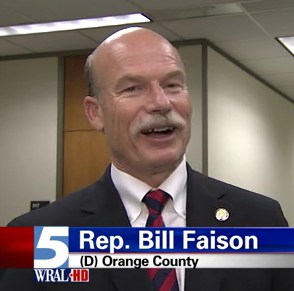
The bill is pending in the House Ways and Means Committee, whose chairman, Rep. Bill Faison, sees the moratorium as an attempt to protect the powerful cable monopoly. Faison, a Democrat who represents Orange and Caswell counties, is meeting Wednesday with representatives of the telecommunications industry and local government leaders to discuss options.
Senator David Hoyle (D-Gaston) couldn’t get his Senate bill the time of day in the North Carolina House, so he attached it to a popular House bill to extend the e-NC Authority — North Carolina’s initiative to promote better broadband. Now a good bill is infected, like a virus, by Hoyle’s tireless work on behalf of Time Warner Cable.
Hoyle, who has cashed checks from the cable and phone lobbies for years, is proud of sticking it to consumers in his state.
“I want my bill passed. They want their bill passed. So, if they want theirs, they’re going to have to take up mine,” Hoyle told WRAL-TV.
Hoyle, who plans to retire at the end of his term, faces no consequences from Gaston County voters, so he doesn’t care if his bill effectively protects incumbent cable companies who have raised their rates far above the rate of inflation for years. Hoyle wants a one year moratorium to stop local communities from building their own broadband networks to improve service to residents and deliver lower pricing.
One community that escaped Time Warner’s relentless rate hiking is Wilson, where a municipal broadband project called Greenlight effectively forced a red light on Time Warner’s plans to increase rates in the community earlier this year. Wilson was the only city we could find in the state where rates remained the same, and residents have Greenlight and city officials to thank for that.
Hoyle and his friends at the cable company are outraged at the thought of North Carolina communities stopping the rate hike gravy train. After all, less money for Time Warner equals less money for campaign contributions to friendly politicians.
“Do we, as government, want to get in competition with private enterprise and my answer to that is no, and I am passionate about that,” Hoyle said.
If only his constituents could afford to pay him enough to be passionate about their interests.
Rep. Bill Faison, (D-Orange), is among the lawmakers sponsoring the broadband stimulus bill, which was a sure thing until Hoyle got his hands on it. Faison called Hoyle’s amendments anti-competitive and pro-rate increase, both bad for North Carolina consumers.
“I decide what gets put on the agenda,” Faison told the Charlotte Observer. “It’s unlikely that any bill with a moratorium in it has a chance of getting through the House.”
Hoyle’s strenuous efforts to perform legislative gymnastics on behalf of cable and phone companies have not gone unnoticed by Faison. He suggested Hoyle’s latest move represented an “interesting political maneuver,” but he doesn’t intend to sit still for it. Faison and other pro-consumer legislators are meeting this week to consider how to strip Hoyle’s nonsense out of HB1840 and shove it in the nearest trash can. For comparison purposes, here is the original bill.
Consumers show no love for Time Warner. Charlotte residents had choice words for their cable company when they learned it was behind the push to stop municipal competition:
◊ Time Warner is about to pay for being jerks to their customers, and it’s high time.
◊ Time Warner cable: I hope they rot. It’s about dang time that municipal governments started providing free broadband to their citizens. The fact that multiple households need their own wireless routers, broadcast on different channels, is a totally inefficient use of technology. Companies like TW Cable want to keep citizens constrained, which runs totally opposite to the promise of the Internet. Find out which boneheads in the Senate are pushing for this and vote them out. They’re clearly more interested in money from the cable companies than in serving their constituents.
◊ For cable to argue unfair competition is laughable when they operate a virtual monopoly.
◊ Instead of fighting this legislation, why doesn’t Time-Warner Cable focus on making its service so reliable and reasonably priced that no city or county will seriously consider managing this themselves? I find it hard to believe any local government could actually run this type of technology more efficiently than a company with TWC’s resources can, but the threat of competition helps keep TWC on their toes. P.S. I lost my TWC signal for 90 minutes this past Sunday right in the middle of the US Open and Brazil-Ivory Coast World Cup game. Nice.
A vote on the House measure is imminent, so North Carolina consumers should be contacting the House Committee members listed below and urge them not to allow any part of Hoyle’s language to remain in HB1840.
[flv width=”576″ height=”344″]http://www.phillipdampier.com/video/WRAL Raleigh NC Broadband Bill Debate 6-28-10.flv[/flv]
WRAL-TV in Raleigh discusses Hoyle’s language and how it ended up in a broadband stimulus request bill. (2 minutes)
House Ways and Means/Broadband Connectivity Committee
| County | Name | Telephone # | Party | |
| Mecklenburg | Kelly Alexander | 919-733-5778 | [email protected] | Democrat |
| Nash, Hallifax | Angela R. Bryant | 919-733-5878 | [email protected] | Democrat |
| Rowan | Lorene Coates | 919-733-5784 | [email protected] | Democrat |
| Orange, Caswell | Bill Faison | 919-715-3019 | [email protected] | Democrat |
| Burke, McDowell | Mitch Gillespie | 919-733-5862 | [email protected] | Republican |
| Mecklenburg | Jim Gulley | 919-733-5800 | [email protected] | Republican |
| Haywood, Jackson, Macon, Swain | R. Phillip Haire | 919-715-3005 | [email protected] | Democrat |
| Brunswick, Columbus | Dewey L. Hill | 919-733-5830 | [email protected] | Democrat |
| Catawba | Mark K. Hilton | 919-733-5988 | [email protected] | Republican |
| Franklin, Hallifax, Nash | John May | 919-733-5860 | [email protected] | Democrat |
| Allegheny, Surry | Sarah Stevens | 919-715-1883 | [email protected] | Republican |
| Mecklenburg | Thom Tillis | 919-733-5828 | [email protected] | Republican |
| Edgecomb, Wilson | Joe P. Tolson | 919-715-3024 | [email protected] | Democrat |
| Durham, Person | W. A. (Winkie) Wilkins | 919-715-0850 | [email protected] | Democrat |
This article contains the following correction since original publication: Our original article did not fully explain the bill to which Sen. Hoyle attached his municipal broadband moratorium. For clarification purposes, that bill is HB1840, legislation to extend the authority of the e-NC Authority. Our original article carried WRAL-TV’s language that said the bill provided for “$5 million in federal stimulus to help provide high-speed Internet access in parts of the state.” While that would be nice, it wasn’t an accurate characterization the bill’s intent. Our apologies for the error.


 Subscribe
Subscribe



